Boost Your Business with ChatGPT
August 25, 2023
August 25, 2023
December 23, 2025
December 23, 2025
Thinking about using ChatGPT for your company, but not sure where to start?
With the release of newer models, ChatGPT is now more advanced – offering deeper reasoning, faster responses, and smarter support for small businesses.
In this guide, we’ll show you how to integrate ChatGPT into your daily business operations, from writing your first business plan to scaling your company with AI-powered insights.
Getting Started: ChatGPT for Small Business
With the release of GPT-5, ChatGPT has become a practical tool for small businesses. It now helps with business ideas, data analysis, content creation, and even shaping your marketing strategy.
You can use ChatGPT for business to:
- Draft product descriptions and marketing materials in minutes.
- Write social media posts or social media captions that fit your brand voice.
- Run market research and competitor analysis to identify trends.
- Handle customer inquiries and customer queries with automated responses.
- Generate valuable insights from customer feedback and customer behavior.
You can also learn more about the best GPTs here.
Pros of using ChatGPT in business
Here are some of the biggest advantages of using ChatGPT in business:
- Accessible for small businesses: Start free, or upgrade to Plus for GPT-5 access at $20/month. Larger teams can choose Team or Enterprise for added collaboration and security.
- Speeds up routine work: Tasks like data entry, drafting replies to customer inquiries, or summarizing documents are done in seconds.
- Helps with content creation: From social media posts to polished product descriptions, ChatGPT supports the content creation process while keeping your brand voice consistent. Connect ChatGPT to Canva to turn draft copy into designs.
- Generates fresh business ideas: You can brainstorm new services, refine your marketing strategy, or run quick keyword research to fuel your marketing efforts.
- Enhances customer experience: Integrated into a customer service platform, ChatGPT can handle simple customer queries with automated responses and boost overall customer satisfaction.
💡 Pro Tip: Want transcripts and insights from your meetings on Zoom, Microsoft Teams, or Google Meet without uploading transcripts to ChatGPT? Use Tactiq to capture everything without switching tools.
Cons of using ChatGPT in business
While ChatGPT is a powerful tool, it isn’t without challenges. Here are some key drawbacks to keep in mind:
- Risk of inaccuracies: ChatGPT may occasionally generate incorrect information or misread prompts, which can mislead decisions if unchecked.
- Lack of human judgment: AI can’t replace human interaction in areas that require empathy, nuance, or complex negotiation.
- Learning curve for teams: Employees need guidance on implementing ChatGPT effectively. Without training, results can be inconsistent.
- Data and privacy concerns: Even with strong data security in enterprise plans, businesses handling sensitive information must have their own safeguards in place.
How to Use ChatGPT to Write a Business Plan
One of the first steps for any new venture is creating a business plan. This document outlines your business ideas, goals, target audience, revenue model, and marketing strategy. Writing one from scratch can take days, but using GPT for business plan makes the process much faster.
By feeding it details about your product, market, and goals, you can quickly get a clear structure with sections like market research, competitor analysis, and financial projections. GPT-5’s improved reasoning also helps with data analysis, so you can make more informed decisions early on. Alternatively, tools like an AI business plan generator make it easier to structure your business plan quickly and efficiently, ensuring all key elements are covered.
Here are a few useful prompts:
- “Write a one-page business plan for [product/service].”
- “Generate a SWOT analysis for a [type of business].”
- “Provide potential revenue streams for a [specific industry].”
- “Suggest a mission statement for a company focused on [value or service].”
- “Outline the steps for a market analysis in [industry/region].”
When I moved from freelancing to building my agency, I knew my product, audience, and pricing, but struggled to organize it all. ChatGPT helped me create a one-page business plan and turn it into a PDF document I could share with partners.
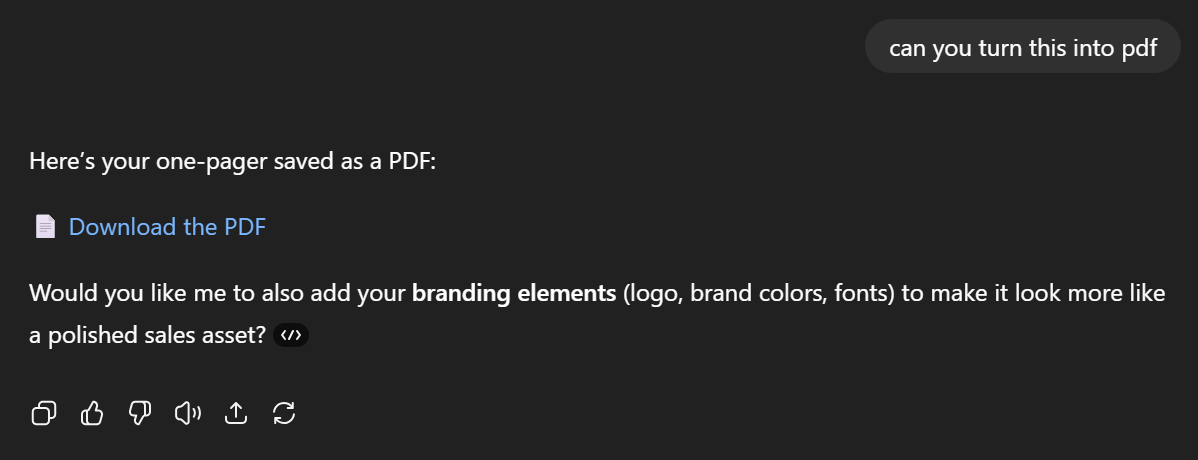
How to Use ChatGPT for Business Strategy
Once your business plan is ready, the next step is strategy. While a plan explains your goals and direction, a strategy focuses on how you’ll compete, grow, and reach your target audience.
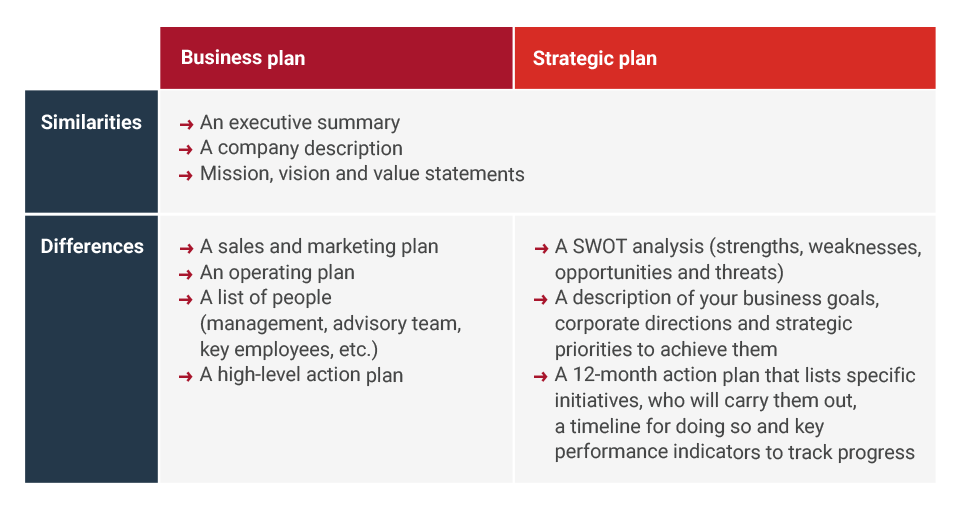
ChatGPT can support this stage by giving you valuable insights into markets, competitors, and trends. It won’t replace in-depth market research, but it can speed up the process and help you make more informed decisions.
Here are some practical ways to use ChatGPT for business strategy:
- Research & insights: Ask about industry trends, consumer preferences, or competitor strengths.
- Validate ideas: Run your proposed marketing tactics or business moves through ChatGPT to stress-test them.
- Brainstorm partnerships: Generate ideas for collaborations or distribution channels.
- Scenario planning: Explore “what if” cases for expansion or risk management. Strategic forecasting: Utilize data-driven insights to expand your business sustainably while identifying new opportunities and mitigating potential risks.
For example, I asked ChatGPT about different customer acquisition channels for my content agency. I already had a clear marketing strategy, but I wanted to see if there were other types of companies or creators worth targeting. ChatGPT suggested new segments I hadn’t considered, which led me to adjust my outreach and test fresh campaigns.

Here are prompt ideas you can use to help with business strategy:
- “What are the emerging trends in the [specific industry] that businesses should be aware of?”
- “Provide a competitive analysis of [your industry] in [specific region].”
- “Suggest partnership opportunities for a [type of business].”
- “Outline go-to-market strategies for launching a new [product/service] in [specific region].”
- “Describe challenges in scaling a business in the [specific sector].”
- “Generate best practices for customer engagement in the [specific industry].”
- “What are the most effective pricing strategies for [type of product/service]?”
- “How can a [type of business] leverage digital marketing to reach more customers?”
These questions and prompts allow you to discover more opportunities that you usually won’t think of, because you’re limited by your own knowledge and experience. But always remember to complement the AI's insights with human judgment and expertise.
How to Use ChatGPT for Business Development
Once your business plan and strategy are in place, it’s time to move forward and grow. Business development isn’t just for startups; established companies also rely on it to find potential customers, build partnerships, and refine their marketing strategies.
ChatGPT can help at this stage by:
- Gather insights: Spot market shifts and analyze customer behavior quickly.
- Draft materials: Create pitches, proposals, and lead-nurturing emails in minutes.
- Suggest tactics: Recommend new marketing tactics and channels for lead generation.
- Assist sales teams: Offer negotiation tips or generate automated responses to common customer inquiries.
I’ve used ChatGPT myself to develop an influencer marketing strategy for a client.
My client, a life coach, wanted to connect with companies investing in employee wellness. I gave ChatGPT examples of the types of companies we had in mind and asked for similar ones in specific countries.
About 70% of the suggestions were spot on, while the rest weren’t a good fit, but that initial list gave me a strong starting point. It helped me track down more companies on LinkedIn and refine our outreach, which would have taken much longer without AI support.
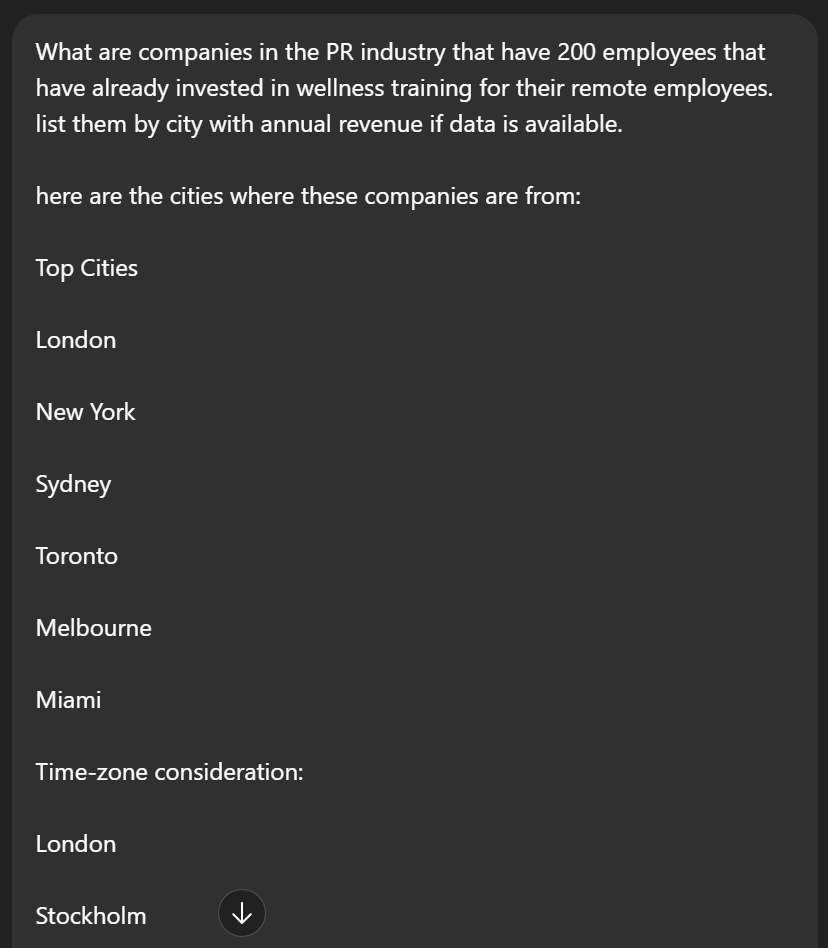
Here are prompt ideas for business development:
- “Detail the market landscape for [product/service] in [specific region].”
- “Generate a pitch to introduce [product/service] to new clients.”
- “Find similar companies to [company name] in [locations].”
- “Suggest sectors for partnership with a [type of business].”
- “Draft an introductory email for a partnership proposal focusing on [benefit].”
- “Identify potential challenges in entering [market/region] with our [product/service].”
Remember that these are only starting points. Not all of the suggestions provided will be accurate and relevant. Make sure to use your own expertise to understand which advice is useful and which ones to discard.
How to Use ChatGPT for Business Analysis
This is, by far, my favorite part of using ChatGPT: business analysis. As a founder or manager, you’ll most likely encounter data to analyze. With ChatGPT, you can speed up this process.
You can use it for:
- Inventory analysis: Spot stock shortages, inefficiencies, or over-ordering.
- Customer service analysis: Review customer feedback to improve products and customer satisfaction.
- Marketing analysis: Paste data from Google Analytics or ad campaigns and ask ChatGPT to identify trends.
- Sales analysis: Upload CRM exports to uncover sales performance, strengths, and areas for growth.
Beyond campaign data, many teams also rely on ChatGPT for meeting minutes, using it to turn transcripts into concise summaries and action items right after calls.
Here are a few prompts to get you started:
- “Provide insights on effective inventory management for [your type of business].”
- “Suggest ways to measure ROI from a digital marketing campaign focused on LinkedIn.”
- “Identify wins and losses from this campaign [paste data].”
- “Give possible reasons why our [campaign type] underperformed [paste data].”
I use ChatGPT this way for organic search performance. I gather data from Google Analytics, Search Console, and Ahrefs, then ask it to analyze data and summarize patterns. Instead of combing through reports manually, ChatGPT points out both increases and declines. I then refine these insights and share a clean summary with our CEO.
You can also extend this workflow with ChatGPT connectors, linking it to tools like Canva for instant design assets or Google Calendar to keep track of campaign timelines and reviews.
For campaigns outside my expertise, I’ll also ask ChatGPT for troubleshooting advice (for example, why Instagram ads might not be converting), then cross-check those ideas with expert colleagues. It speeds up the content creation process and gives me valuable insights without losing time.
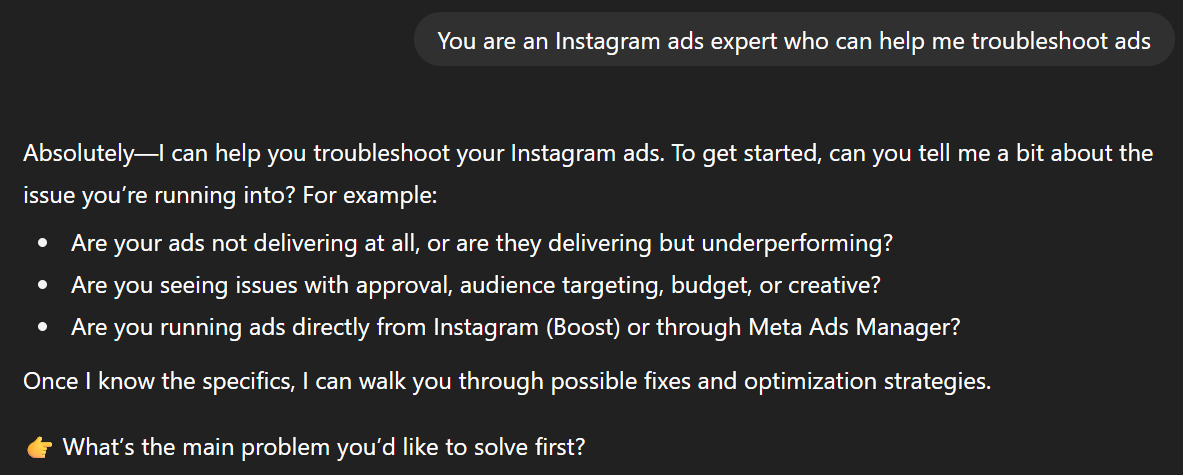
How to Use ChatGPT for Improving (And Potentially Scaling) Your Business
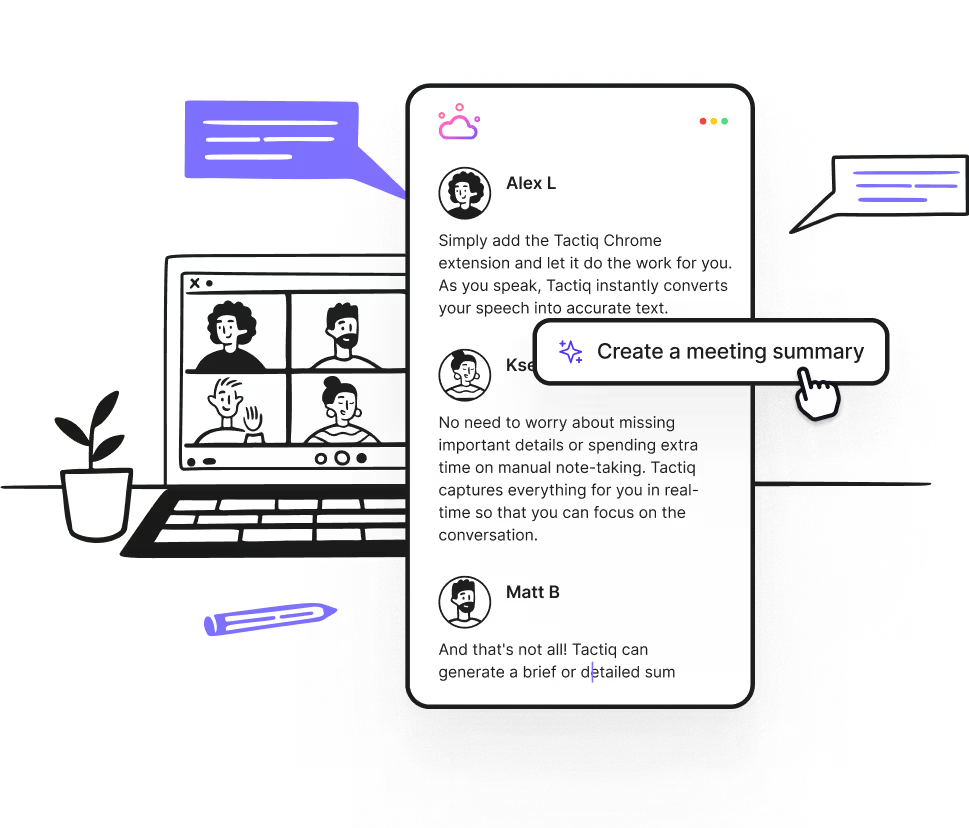
Once the foundation is set, the focus shifts to improving workflows and preparing to scale. Small optimizations like cutting down time in meetings or automating simple tasks often unlock the biggest growth.
Meetings are one of the biggest time drains for any company. Tactiq solves this by capturing and transcribing conversations in real time across Zoom, Google Meet, and Microsoft Teams. Instead of juggling notes, you get a clear transcript and instant insights from Tactiq’s built-in AI. No need to switch to ChatGPT separately.
Tactiq’s AI features for scaling businesses:
- Custom AI Prompts: Ask unlimited questions about transcripts and get insights specific to your role, such as project updates, action items, or risks.
- AI Workflows: Automate follow-up emails, updating Jira or Trello, or creating documentation without manual effort.
- File Uploads: Upload video or audio recordings to generate transcripts and AI-powered summaries.
- Real-Time Translation: Get live multilingual transcripts during calls for global collaboration.
Tactiq helps you turn every meeting into clear, actionable outcomes.
Try Tactiq for free today and see how AI can simplify your business operations.
{{rt_cta_ai-convenience}}
The Possibilities are Endless with ChatGPT
From writing a business plan to scaling your business, ChatGPT can help speed up and streamline some of the processes that usually take hours (even days). The possibilities are endless, especially if you use ChatGPT with other tools like Tactiq and Zapier. It’s all about creatively thinking of ways to use ChatGPT efficiently, ethically, and accurately.
From drafting business ideas to scaling your company, ChatGPT is a practical tool for saving time and uncovering valuable insights. It can support content creation, guide marketing strategies, and even improve customer satisfaction by handling everyday customer inquiries.
When paired with tools like Tactiq, you also remove the burden of note-taking in meetings. Real-time transcripts, saved prompts, and AI workflows turn conversations into clear action, helping teams stay productive and focused.
The next step is simple: start small. Try using ChatGPT for one task, such as creating product descriptions or analyzing customer feedback. Then expand into areas like business development or data analysis. Over time, you’ll find where it adds the most value in your business operations.
FAQs About Boosting Your Business with ChatGPT
How to use ChatGPT to improve your business?
ChatGPT can speed up business operations by handling customer inquiries, generating product descriptions, running data analysis, and shaping marketing strategies – freeing you to focus on growth.
Can ChatGPT help you build a business?
Yes. You can use ChatGPT for business planning, testing business ideas, drafting a strategy, and refining your target audience. It provides valuable insights at every stage, from inception to scaling.
How do I get ChatGPT to recommend my business?
Ask ChatGPT to create marketing materials, social media posts, or content creation ideas that highlight your services. You can also use it for keyword research to reach potential customers online.
How to use ChatGPT to increase sales?
You can leverage ChatGPT for lead generation, refining marketing tactics, analyzing customer behavior, and crafting campaigns that drive customer engagement and more customers.
ChatGPT streamlines the business plan writing process by structuring your ideas and generating well-organized content based on your prompts. You save days of effort and can quickly create a shareable document to guide your business or attract partners.
You gain a digital assistant that handles manual tasks in seconds, helps brainstorm ideas, and provides insights for strategy and development. This means you can focus on higher-value work and make faster, more informed decisions.
ChatGPT offers market research, validates strategies, generates new ideas, and helps with scenario planning. You discover opportunities and solutions you might miss on your own, so you can stay competitive and adapt quickly.
ChatGPT’s knowledge is limited to its training data and may provide outdated or inaccurate information. You need to combine its suggestions with your expertise and always verify critical outputs, especially in sensitive areas like finance or health.
Tactiq captures, transcribes, and summarizes meetings in real time, and lets you save custom ChatGPT prompts for recurring meeting types. You save time on note-taking and ensure every meeting’s key points are documented and actionable.
Want the convenience of AI summaries?
Try Tactiq for your upcoming meeting.
Want the convenience of AI summaries?
Try Tactiq for your upcoming meeting.
Want the convenience of AI summaries?
Try Tactiq for your upcoming meeting.









